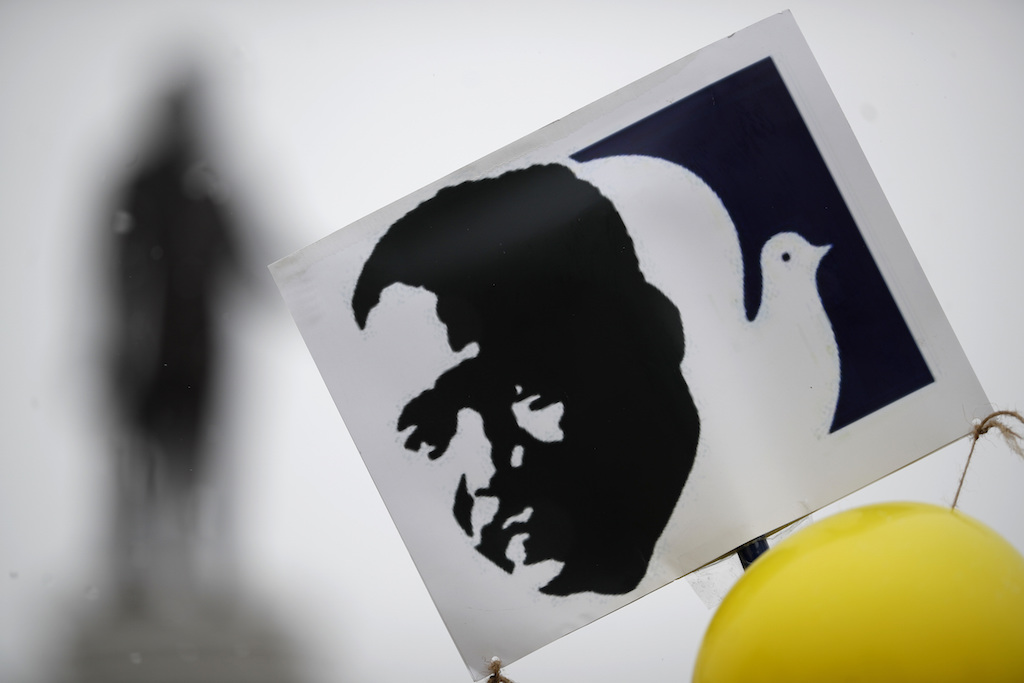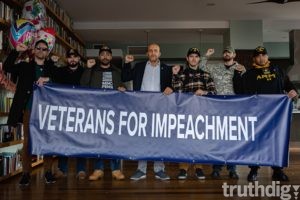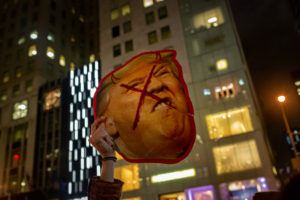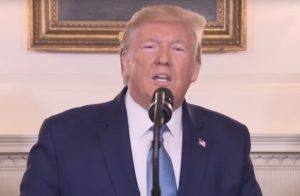America Needs a Radical Dr. King, Not a New Obama
The real Martin Luther King—not a sanitized version—was a democratic socialist who believed the U.S. had to reconstruct its whole system. A placard bearing the likeness of slain civil rights leader Martin Luther King Jr. in Denver on Jan. 15, as marchers gathered in City Park beneath the statue of King, back, for the annual parade to mark his birthday. (David Zalubowski / AP)
A placard bearing the likeness of slain civil rights leader Martin Luther King Jr. in Denver on Jan. 15, as marchers gathered in City Park beneath the statue of King, back, for the annual parade to mark his birthday. (David Zalubowski / AP)
As the 50th anniversary of Dr. Martin Luther King’s violent death (on April 4, 1968) grows closer, you can expect to hear more and more in U.S. corporate media about the real and alleged details of his immediate physical assassination (or perhaps execution). You will not be told about King’s subsequent and ongoing moral, intellectual, and ideological assassination.
I am referring to the conventional, neo-McCarthyite and whitewashed narrative of King that is purveyed across the nation every year, especially during and around the national holiday that bears his name. This domesticated, bourgeois airbrushing portrays King as a mild liberal reformist who wanted little more than a few basic civil rights adjustments in a supposedly good and decent American system—a loyal supplicant who was grateful to the nation’s leaders for finally making noble alterations. This year was no exception.
The official commemorations never say anything about the Dr. King who studied Marx sympathetically at a young age and who said in his last years that “if we are to achieve real equality, the United States will have to adopt a modified form of socialism.” They delete the King who wrote that “the real issue to be faced” beyond “superficial” matters was the need for a radical social revolution.
It deletes the King who went on the Canadian Broadcasting Corp. (CBC) in late 1967 to reflect on how little the black freedom struggle had attained beyond some fractional changes in the South. He deplored “the arresting of the limited forward progress” blacks and their allies had attained “by [a] white resistance [that] revealed the latent racism that was [still] deeply rooted in U.S. society.”
“As elation and expectations died,” King explained on the CBC, “Negroes became more sharply aware that the goal of freedom was still distant and our immediate plight was substantially still an agony of deprivation. In the past decade, little has been done for Northern ghettoes. All the legislation was to remedy Southern conditions—and even these were only partially improved.” Worse than merely limited, King felt, the gains won by black Americans during what he considered just the “first phase” of their freedom struggle (1955-1965) were dangerous in that they “brought whites a sense of completion”—a preposterous impression that the so-called “Negro problem” had been solved and that there was therefore no more basis or justification for further black activism. “When Negroes assertively moved on to ascend to the second rung of the ladder,” King noted, “a firm resistance from the white community developed. … In some quarters it was a courteous rejection, in others it was a stinging white backlash. In all quarters unmistakably, it was outright resistance.”
Explaining to his CBC listeners the remarkable wave of race riots that washed across U.S. cities in the summers of 1966 and 1967, King made no apologies for black violence. He blamed “the white power structure … still seeking to keep the walls of segregation and inequality intact” for the disturbances. He found the leading cause of the riots in the reactionary posture of “the white society, unprepared and unwilling to accept radical structural change,” which “produc[ed] chaos” by telling blacks (whose expectations for substantive change had been aroused) “that they must expect to remain permanently unequal and permanently poor.”
King also blamed the riots in part on Washington’s imperialist and mass-murderous war on Vietnam. Along with the misery it inflicted on Indochina, King said, the United States’ savage military aggression against Southeast Asia stole resources from Lyndon Johnson’s briefly declared and barely fought “war on poverty.” It sent poor blacks to the front killing lines to a disproportionate degree. It advanced the notion that violence was a reasonable response and even a solution to social and political problems.
Black Americans and others sensed what King called “the cruel irony of watching Negro and white boys on TV screens as they kill and die together for a nation that has been unable to seat them together in the same school. We watch them in brutal solidarity burning the huts of a poor village, but we realize that they would never live on the same block in Detroit,” King said on the CBC, adding that he “could not be silent in the face of such cruel manipulation of the poor.”
Racial hypocrisy aside, King said that “a nation that continues year after year to spend more money on military defense [here he might better have said “military empire”] than on programs of social uplift is approaching spiritual doom.”
Did the rioters disrespect the law, as their liberal and conservative critics alike charged? Yes, King said, but added that the rioters’ transgressions were “derivative crimes … born of the greater crimes of the … policy-makers of the white society,” who “created discrimination … created slums [and] perpetuate unemployment, ignorance, and poverty. … [T]he white man,” King elaborated, “does not abide by law in the ghetto. Day in and day out he violates welfare laws to deprive the poor of their meager allotments; he flagrantly violates building codes and regulations; his police make a mockery of law; he violates laws on equal employment and education and the provision of public services. The slums are a handiwork of a vicious system of the white society.”
Did the rioters engage in violence? Yes, King said, but noted that their aggression was “to a startling degree … focused against property rather than against people.” He observed that “property represents the white power structure, which [the rioters] were [quite understandably] attacking and trying to destroy.” Against those who held property “sacred,” King argued that “property is intended to serve life, and no matter how much we surround with rights and respect, it has no personal being.”
What to do? King advanced radical changes that went against the grain of the nation’s corporate state, reflecting his agreement with new left militants that “only by structural change can current evils be eliminated, because the roots are in the system rather in man or faulty operations.” King advocated an emergency national program providing either decent-paying jobs for all or a guaranteed national income “at levels that sustain life in decent circumstances.” He also called for the “demolition of slums and rebuilding by the population that lives in them.”
His proposals, he said, aimed for more than racial justice alone. Seeking to abolish poverty for all, including poor whites, he felt that “the Negro revolt” was properly challenging each of what he called “the interrelated triple evils” of racism, economic injustice/poverty (capitalism) and war (militarism and imperialism). The black struggle had thankfully “evolve[ed] into more than a quest for [racial] desegregation and equality,” King said. It had become “a challenge to a system that has created miracles of production and technology” but had failed to “create justice.”
“If humanism is locked outside the [capitalist] system,” King said on CBC five months before his assassination (or execution), “Negroes will have revealed its inner core of despotism and a far greater struggle for liberation will unfold. The United States is substantially challenged to demonstrate that it can abolish not only the evils of racism but the scourge of poverty and the horrors of war.”
There should be no doubt that King meant capitalism when he referred to “the system” and its “inner core of despotism.” This is clear from the best scholarship on King, including David Garrow’s epic, Pulitzer Prize-winning biography, “Bearing the Cross: Martin Luther King, Jr. and the Southern Christian Leadership Council” (HarperCollins, 1986).
No careful listener to King’s CBC talks could have missed the radicalism of his vision and tactics. “The dispossessed of this nation—the poor, both White and Negro—live in a cruelly unjust society,” King said. “They must organize a revolution against that injustice,” he added.
Such a revolution would require “more than a statement to the larger society,” more than “street marches,” King proclaimed. “There must,” he added, “be a force that interrupts [that society’s] functioning at some key point.” That force would use “mass civil disobedience” to “transmute the deep rage of the ghetto into a constructive and creative force” by “dislocat[ing] the functioning of a society.”
“The storm is rising against the privileged minority of the earth,” King added for good measure. “The storm will not abate until [there is a] just distribution of the fruits of the earth.” The “massive, active, nonviolent resistance to the evils of the modern system” that King advocated was “international in scope,” reflecting the fact that “the poor countries are poor primarily because [rich Western nations] have exploited them through political or economic colonialism. Americans in particular must help their nation repent of her modern economic imperialism.”
King was a democratic socialist mass-disobedience-advocating and anti-imperialist world revolution advocate. The guardians of national memory don’t want you to know about that when they purvey the official, doctrinally imposed memory of King as an at most liberal and milquetoast reformer. (In a similar vein, our ideological overlords don’t want us to know that Albert Einstein [Time magazine’s “Person of the 20th Century”] wrote a brilliant essay making the case for socialism in the first issue of venerable U.S.-Marxist magazine Monthly Review—or that Helen Keller was a fan of the Russian Revolution.)
The threat posed to the official bourgeois memory by King’s CBC lectures—and by much more that King said and wrote in the last three years of his life—is not just that they show an officially iconic gradualist reformer to have been a democratic socialist opponent of the profits system and its empire. It is also about how clearly King analyzed the incomplete and unfinished nature of the nation’s progress against racial and class injustice, around which all forward developments pretty much ceased in the 1970s, thanks to a white backlash that was already well underway in the early and mid-1960s (before the rise of the Black Panthers, who liberal historians like to blame for the nation’s rightward racial drift under Richard Nixon and Ronald Reagan) and to a top-down corporate war on working-class Americans that started under Jimmy Carter and then went ballistic under Ronald Reagan.
The “spiritual doom” imposed by U.S. militarism has lived on, with Washington having directly and indirectly killed untold millions of Central Americans, South Americans, Africans, Muslims, Arabs, and Asians in many different ways over the years since Vietnam. Accounting for roughly 40 percent of the world’s military expenditure, the U.S. maintains Cold War-level “defense” (empire) budgets to sustain an historically unmatched global empire (with at least 800 military bases spread across more than 80 foreign countries and “troops or other military personnel in about 160 foreign countries and territories”) even as a near-record 45 million U.S.-Americans remain stuck under the federal government’s notoriously inadequate poverty level. A very disproportionate number of the nation’s poor are black and Latino/a.
It is obvious that the racist and white-supremacist real estate baron Donald J. Trump spoke disingenuously in tongue when he mouthed nice words about Dr. King last Monday. But what about his predecessor, Barack Obama, the nation’s first technically black president? It was cruelly ironic that Obama kept a bust of King in the Oval Office to watch over his regular betrayal of the martyred peace and justice leader’s ideals. Consistent with Dr. Adolph Reed Jr.’s early (1996) dead-on description of the future president as “a smooth Harvard lawyer with impeccable credentials and vacuous to repressive neoliberal politics,” Obama consistently backed top corporate and financial interests (whose representatives filled and dominated his administrations, campaigns, and campaign coffers) over and against those who would undertake serious programs to end poverty, redistribute wealth (the savage re-concentration of which since Dr. King’s time has produced a New Gilded Age in the U.S.), grant free and universal health care, constrain capital, and save livable ecology as it approached a number of critical tipping points on the accelerating path to irreversible catastrophe. Thus is that one of Obama’s supporters (Ezra Klein) was moved in late 2012 to complain that a president “whose platform consists of Romney’s health care bill, Newt Gingrich’s environmental policies, John McCain’s deficit-financed payroll tax cuts, George W. Bush’s bailouts of filing banks and corporations, and a mixture of the Bush and Clinton tax rate” was still being denounced as a “leftist.”
Obama opposed calls for any special programs or serious federal attention to the nation’s savage racial inequalities, so vast now that the median of white households was 20 times that of black households and 18 times that of Hispanic households near the end of his presidency. He did this while the fact of his ascendency to the White House deeply reinforced white America’s sense that racism was over as a barrier to black advancement and generated its own significant white backlash that only worsened the situation of less privileged black Americans.
Obama made it crystal clear in ways that no white president could that what Dr. King in 1963 called America’s unpaid “promissory note” and “bad check” to black America would remain un-cashed. This was all too sadly consistent with Obama’s preposterous 2007 campaign claim (at a commemoration of the King-led 1965 Selma Voting Rights March) to believe that blacks had already come “90 percent” of the way to equality in the U.S.
Completing the “triple evils” hat trick, Obama—the self-appointed chief-executioner atop the special forces global war on (of) terror kill list—embraced and expanded upon the vast criminal and worldwide spying and killing operation he inherited from Dick Cheney, Donald Rumsfeld, Paul Wolfowitz and George W. Bush. He tamped down Bush’s failed ground wars only to ramp up and inflate the role of unaccountable special force and drone attacks in the spirit of his dashing and reckless imperial role model John Fitzgerald Kennedy. Obama’s drone program, Noam Chomsky noted in early 2015, was “the most extreme terrorist campaign of modern times.” It “target[ed] people suspected of perhaps intending to harm us some day, and any unfortunates who happen to be nearby,” Chomsky wrote.
In waging his deadly and disastrous, nation-wrecking and regionally destabilizing air war on Libya, Obama (unlike Bush prior to the invasion of Iraq) did not even bother with the pretense of seeking Congressional approval. “It should be a scandal,” Stansfield Smith wrote on CounterPunch one year ago, “that left-liberals paint Trump as a special threat, a war mongerer—[but] not Obama who is the first president to be at war every day of his eight years, who is waging seven wars at present, who dropped three bombs an hour, 24 hours a day, in 2016.” As Alan Nairn told Democracy Now’s Amy Goodman in early 2010, Obama kept the nation’s giant imperial machinery “set on kill.”
Meanwhile, Obama far surpassed the Cheney-Bush regime when it came to repressing anti-war dissenters, not to mention those who opposed the rule of the 1 percent—smashed by a coordinated federal campaign in the fall of 2011. “As all kinds of journalists have continuously pointed out,” Glenn Greenwald noted in early 2014, “the Obama administration is more aggressive and more vindictive when it comes to punishing whistleblowers than any administration in American history, including the Nixon administration.”
Furthermore, and to make matters far worse, Obama helped keep the planet set on burn. As Stansfield Smith noted two days before the horrid Trump’s inauguration:
Obama, who says he recognizes the threat to humanity posed by climate change, still invested at least $34 billion to promote fossil fuel projects in other countries. That is three times as much as George W Bush spent in his two terms, almost twice that of Ronald Reagan, George HW Bush and Bill Clinton put together. … Obama financed 70 foreign fossil fuel projects. When completed they will release 164 million metric tons of carbon dioxide into the atmosphere every year—about the same output as the 95 currently operating coal-fired power plants in Ohio, Pennsylvania and Oklahoma. He financed two natural gas plants on an island in the Great Barrier Reef, as well as two of the largest coal mines on the planet. …. Moreover, under Obama, the U.S. has reversed the steady drop in U.S. oil production which had continued unchecked since 1971. The U.S. was pumping just 5.1 million barrels per day when Obama took office. By April 2016 it was up to 8.9 million barrels per day. A 74% increase.
As Obama proudly said in 2012, in the film “This Changes Everything”:
‘Over the last three years I’ve directed my administration to open up millions of acres for gas and oil exploration across 23 different states. We’re opening up more than 75% of our potential oil resources offshore. We’ve quadrupled the number of operating rigs to a record high. We’ve added enough oil and gas pipelines to encircle the earth and then some. So, we are drilling all over the place, right now.’ “
“Drill, baby, drill!”
Perhaps the dismal neoliberal Obama presidency—a key midwife to the Trump atrocity—was at least an object lesson on how real progressive and democratic change is about something bigger than a change in the party or color of the people in nominal power. That is certainly something King (who would be 88 today [Jan. 15]) would have understood very well had he been able to witness the endless mendacity of the nation’s first half-white president firsthand.
“The black revolution,” King wrote in a posthumously published 1969 essay titled “A Testament of Hope” (embracing a very different, authentically progressive sort of hope than that purveyed by Brand Obama in 2008) “is much more than a struggle for the rights of Negroes. It is forcing America to face all its interrelated flaws—racism, poverty, militarism, and materialism. It is exposing evils that are rooted deeply in the whole structure of our society. It reveals systemic rather than superficial flaws and suggests that radical reconstruction of society itself is the real issue to be faced.”
Those words ring as true as ever today, with heightened urgency as it becomes undeniable that the profits system is driving humanity over an environmental cliff. They are words we never hear during official King Day commemorations.
King, it is worth recalling, was recruited by anti-war progressives to run for the U.S. presidency in 1967. He politely declined, claiming that he’d have little chance of winning and that he preferred to serve as a force of moral conscience for all the nation’s political parties.
The deeper truth, clear from his late-life writing and speeches, is that he had no interest in climbing into the power elite: his passion was directed toward a “revolution” of “the dispossessed” and a mass grass-roots movement for the redistribution of wealth and power—a”radical reconstruction of society itself”—from the bottom up. Dr. King was interested in what the late radical U.S. historian Howard Zinn considered the more urgent politics of “who’s sitting in the streets,” very different from what Zinn saw as the comparatively superficial politics of “who’s sitting in the White House.”
King’s officially deleted radical record and Zinn’s clever and sage dichotomy are worth bearing in mind in coming months and years as we watch the nation’s “left” liberals try to call forth and herald a new Obama (Oprah perhaps?) in 2020. That is certainly one of the last things we need.
Your support matters…Independent journalism is under threat and overshadowed by heavily funded mainstream media.
You can help level the playing field. Become a member.
Your tax-deductible contribution keeps us digging beneath the headlines to give you thought-provoking, investigative reporting and analysis that unearths what's really happening- without compromise.
Give today to support our courageous, independent journalists.






You need to be a supporter to comment.
There are currently no responses to this article.
Be the first to respond.